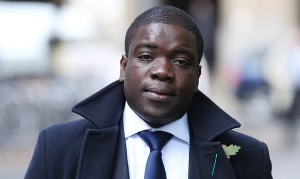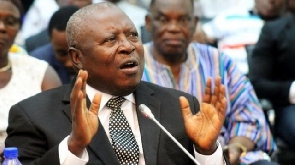A lot has gone on in the past few months as regards the issue of former UBS trader who is accused of booking fictitious trades to cover up big losses during the financial crisis in the United Kingdom between 2008 and 2011.
He pleaded not guilty, saying his senior managers knew what he was doing and encouraged him to take risks.
Adoboli was jailed for seven years in 2012 after being found guilty of fraud that cost UBS $2.3bn (£1.8bn). He was released after serving half his sentence.
38-year-old Adobli lost his most recent legal challenge as he sought permission in the immigration court for a judicial review of the refusal of his last application to remain in the UK. He’s courted the support of several people in the UK and abroad over what some have described as double punishment for the same offense. Mr Adoboli’s local MP, Hannah Bardell, has for instance described the decision and subsequent deportation of Mr. Adoboli as a travesty of justice. “This is a travesty of justice. Kweku has been here since he was 12 and he would have been entitled to British citizenship,” she said. “No one is saying he hasn’t committed a crime, but he has been rehabilitated and is being punished twice.” Even as Kweku Adoboli continues to fight his deportation even while here in Ghana, Ghana’s leading online portal puts together a profile of Kweku Adoboli curled from wikipedia.
PROFILE
Kweku Adoboli (born 21 May 1980) is a former investment manager and rogue trader. He was convicted of illegally trading away US$2 billion (GB£1.3 billion) as a trader for Swiss investment bank UBS.
While at the bank he primarily worked on UBS’ Global Synthetic Equities Trading team in London where he engaged in what would later be known as the 2011 UBS trader scandal. After serving a prison sentence, he lost several appeals against the Home Office decision to deport him to Ghana.
EARLY LIFE
Kweku Adoboli was born on 21 May 1980 in Tema, Ghana, to John Adoboli, a senior United Nations official.He spent his early years in Israel, Syria and Iraq, before moving to the United Kingdom in 1991.
He attended Ackworth School in Pontefract, West Yorkshire, where he was head boy.In his profile on the school’s website, he wrote that he wanted to be an athlete. In 2000, after finishing school, he started reading Chemical Engineering at the University of Nottingham, but switched to E-commerce and Digital Business Studies.
In 2000, he was elected as the Communications Officer of University of Nottingham Students’ Union.In mid-2002, Adoboli worked as a summer intern at UBS’s operations department. He graduated from Nottingham in July 2003.
CAREER
Adoboli joined UBS’s London office as a graduate trainee in September 2006. After working for two years as a trading analyst in the bank’s back office, he was promoted to a Delta One trading desk. In 2008, he became a director on the ETF desk, and by 2010, he was promoted to director, with a total annual salary of almost £200,000.
Beginning in 2008, Adoboli started using the bank’s money for unauthorised trades. He entered false information into UBS’s computers to hide the risky trades he was making. He exceeded the bank’s per-employee daily trading limit of US$100 million, and failed to hedge his trades against risk.
He also used his personal funds on two spread betting accounts, IG Index and City Index, where he lost around £100,000. In mid-2011, UBS launched an internal investigation into Adoboli’s trades. On 14 September 2011, Adoboli wrote an e-mail to his manager admitting to booking false trades.
His trades cost the bank $2 billion (£1.3 billion) and wiped off $4.5 billion (£2.7 billion) from its share price.The trading losses he incurred while trading for his bank were the largest unauthorised trading losses in British history
CHARGES & CONVICTION
On 15 September 2011, Adoboli was arrested by City of London Police.He was charged with two counts of fraud by abuse of position and four counts of false accounting He was in prison on remand until 8 June 2012, when he was granted bail subject to being electronically tagged and placed under curfew at a friend’s house.
On the morning of 20 November 2012, a jury at Southwark Crown Court unanimously found Adoboli guilty on one count of fraud. Later the same day, after receiving an instruction allowing for a majority decision with a single vote against, the jury found him guilty of a second count of fraud.
The jury also found him not guilty on the four false accounting charges. He was sentenced to seven years in prison. The City of London Police said: “This was the UK’s biggest fraud, committed by one of the most sophisticated fraudsters the City of London Police has ever come across.
IMPRISONMENT & SUBSEQUENT APPEAL AGAINST DEPORTATION
Adoboli served out his sentence at HMP Verne in Dorset, then at HMP Ford in West Sussex and finally at HMP Maidstone in Kent. He was released in June 2015.
As he was a Ghanaian citizen and not a British citizen, and had never applied to become naturalised by the Home Secretary to become a British citizen despite having lived in the United Kingdom since 1991, he was subject to the general deportation policy of the Home Office (UKVI) for foreign nationals who have been convicted and sentenced to more than four years of imprisonment.
He was served with deportation proceedings in July 2015, and lived with friends in London and Edinburgh. After his release he gave many talks to students, financial traders and others in the banking industry on operating ethically and avoiding the mistakes he made.
Adoboli lost his original appeal against the Home Secretary’s order of deportation made against him in July 2016, and has since continued to make attempts to appeal; he was eventually denied permission for a judicial review of the deportation order and his deportation was originally scheduled for September 2018.
Adoboli believes his deportation is due to the Home Office hostile environment policy on immigration. Officials from the Home Office (UKVI), however, state that they base their action and the underlying decision on an application of a long-standing government policy, supported by the law.
Kweku Adoboli was finally deported to Ghana on 14 November 2018 after his appeals against deportation were turned down.
General News of Saturday, 17 November 2018
Source: newswiregh













